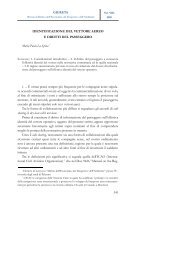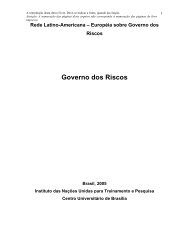Rome II and Tort Conflicts: A Missed Opportunity Abstract Contents
Rome II and Tort Conflicts: A Missed Opportunity Abstract Contents
Rome II and Tort Conflicts: A Missed Opportunity Abstract Contents
Create successful ePaper yourself
Turn your PDF publications into a flip-book with our unique Google optimized e-Paper software.
SYMEON C. SYMEONIDES ROME <strong>II</strong> AND TORT CONFLICTS<br />
promotes this interest. Giving the victim a choice is simply the vehicle for ensuring<br />
this result.<br />
When the law of the state of conduct has a higher st<strong>and</strong>ard of conduct for the<br />
tortfeasor or of financial protection for the victim than the state of injury, the victim<br />
will opt for the law of the conduct state, thus producing the deterring effect the<br />
drafters intended. As the Report notes, if the victim did not have this choice, the<br />
operator would have “an incentive to establish his facilities at the border so as to<br />
discharge toxic substances into a river <strong>and</strong> enjoy the benefit of the neighbouring<br />
country’s laxer rules. This solution would be contrary to the underlying philosophy<br />
of the European substantive law of the environment <strong>and</strong> the ‘polluter pays’<br />
162<br />
principle.” Indeed, the application of the higher st<strong>and</strong>ards of the conduct state in this<br />
scenario is fully justified, whether one thinks in terms of party reliance or expectations<br />
or, more aptly, state interests. After all, the operator should not complain for being<br />
subjected to the st<strong>and</strong>ards of the state in which he acted. Having violated those<br />
st<strong>and</strong>ards, he should bear the consequences of the violation <strong>and</strong> not be allowed to<br />
invoke the lower st<strong>and</strong>ards of another state. In terms of state interests, the application<br />
of the higher st<strong>and</strong>ards of the conduct state promotes that state’s policy in policing<br />
conduct within its borders, without subordinating the policies of the state of injury<br />
because the latter state does not have an interest in applying its lower-st<strong>and</strong>ards to<br />
protect conduct occurring, or tortfeasors acting, beyond its borders. In other words,<br />
this is a case that is described in the American conflicts lexicon as a classic “false<br />
conflict.” As noted earlier, <strong>Rome</strong> <strong>II</strong> would have been a better system if the drafters had<br />
adopted the same logic when drafting the general rule of Article 4(1).<br />
When the law of the state of injury prescribes a higher st<strong>and</strong>ard than the state<br />
of conduct, the victim will not opt for the law of the conduct state, thus again<br />
producing the deterrent effect the drafters intended. As the Report points out, this<br />
application is<br />
[C]onducive to a policy of prevention, obliging operators established in<br />
countries with a low level of protection to abide by the higher levels of<br />
protection in neighbouring countries, which removes the incentive for an<br />
operator to opt for low-protection countries. The rule thus contributes to<br />
raising the general level of environmental protection. 163<br />
Significantly, because Article 7 is not subject to any exceptions, the polluter<br />
cannot avoid the application of the law of the state of injury by arguing, for example,<br />
that the occurrence of the injury in that state was not foreseeable. Apparently the<br />
article assumes that, regardless of distance, foreseeability is always present, or<br />
alternatively, that it should make no difference. One avenue for providing some<br />
protection for the polluter in this case is Article 17, <strong>and</strong> the Report alludes to this<br />
162. Id. 19-20.<br />
163. Explanatory Report, art. 7, at19.<br />
56 AMERICAN JOURNAL OF COMPARATIVE LAW (2008) PAGE 38 OF 46



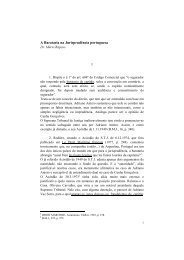
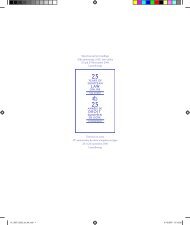
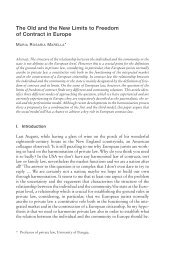

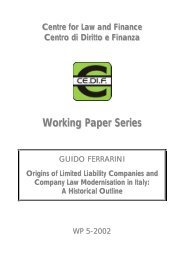
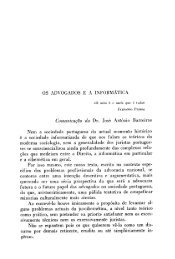
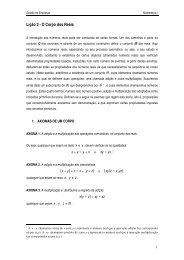
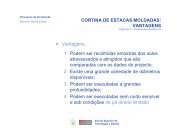
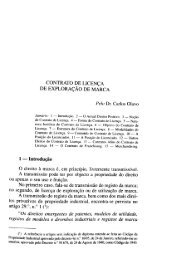
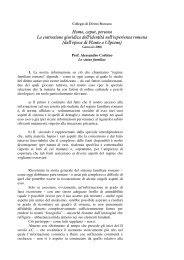
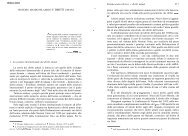

![Luigi Sapio Nozione di islām La parola “islām” [ ] è il mas.dar1 ...](https://img.yumpu.com/15836073/1/185x260/luigi-sapio-nozione-di-islam-la-parola-islam-e-il-masdar1-.jpg?quality=85)
